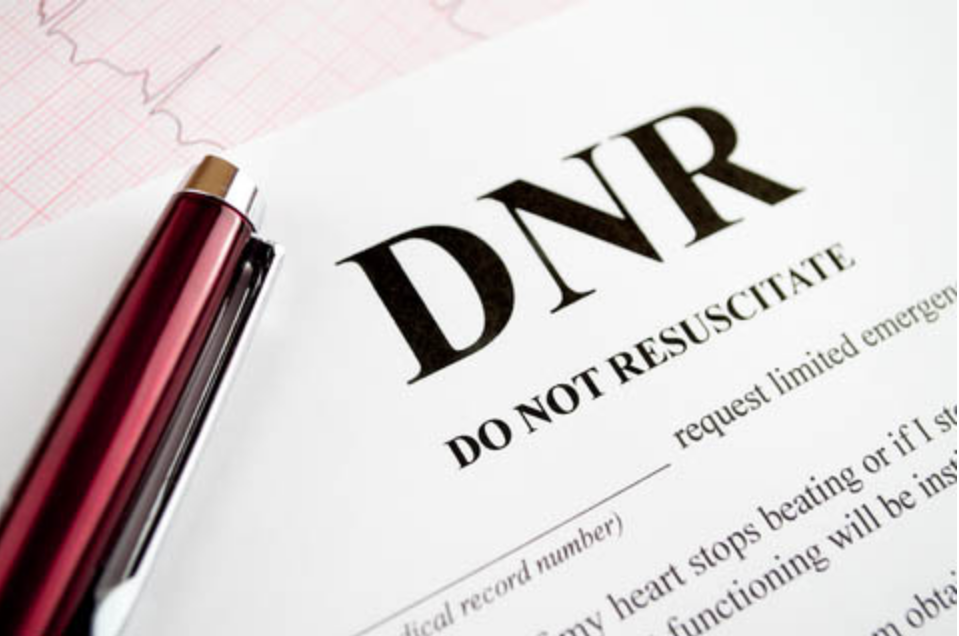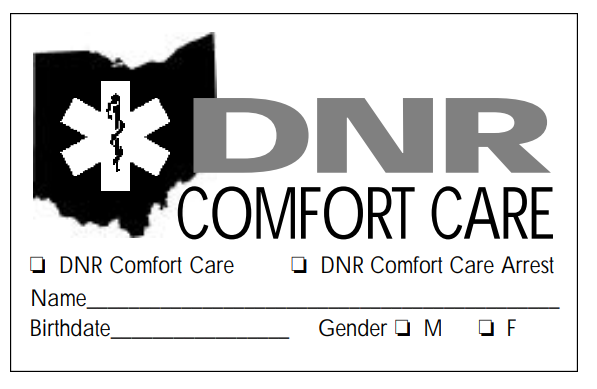
One of the more difficult tasks in your life is deciding a “DNR code status” for yourself or, worse yet, a loved one. DNR is short for Do Not Resuscitate which basically means ‘do not attempt to bring me back to life’. Some people feel very strongly about having peace at the end of life . . . that you pass this life without disturbance. Others want to live at all cost and even if their heart is “bad”, give them every chance to live. These two philosophical differences represent the two ends of a spectrum. If you’ve lived a long life, get ill, and decline in health, your passing is expected . . . and to perform CPR (chest compressions or shocks) seems cruel to some as your last moments could be painful.
In Ohio, the code status is limited to three: Full Code, DNR Comfort Care Arrest, and DNR Comfort Care.
The naming of these three advanced directives is helpful in some ways and confusing in others. DNR Code Status designations vary from state to state or even from county to county so find out what applies specifically in your area.
In Ohio (where my patients are located), what follows below is what applies to you.
We’ll review these code status’ individually and then go over some examples so you can be perfectly clear on the implications.
FULL CODE
Full code is easy to describe. It means you want “everything” that is medically possible done to keep you (or your loved one) alive. . . no matter what. This essentially means that no matter how much suffering is involved while getting care, it is worth it to get better when all is said and done.
When patients are diagnosed with cancer, many undergo chemotherapy that may cause nausea, vomiting, weight loss, hair loss, diarrhea, and more. . . all in order to get rid of the cancer, and recover and lead a happy normal life after the dust settles. If your heart stopped during this time, it would be appropriate to shock (with the paddles and the doctor yells “CLEAR” and then ZAP) the patient in an attempt to re-start the heart and get them past this sick time.
You get everything that is clinically indicated.
Not everything that is medically possible. Your doctor still has the last say what is medically reasonable.
DNR Comfort Care Arrest
This DNR code status is the confusing one! DNR Comfort Care Arrest essentially means that the patient is a FULL CODE until they “arrest” (heart stops or they stop breathing) at which point they would be made “comfortable” without shocking the heart or being put on a ventilator. This DNR code status is appropriate for most ‘older people’ or patients with heart or lung disease.
If you are 85 years old and your heart stops, it is because your heart has run its course. No amount of shocking and chest compressions will convince your heart to start again. Attempts to start your heart will be futile, and your last moments will be painful as electric shocks and other interventions hurt (again, we tolerate the pain of these options with a FULL CODE so that we can live in case the heart stops and its not because it has run its course).
DNR Comfort Care Arrest is appropriate for most older patients because they will get everything clinically available to them, but when their last moment comes (if they “arrest”), they will be be “kept comfortable”.
With a DNR Comfort Care Arrest, you will get:
- Surgery if needed
- Antibiotics for all infections indicated
- Intensive care treatment (ICU, etc.)
- Chemotherapy for cancers
- Anything else medically indicated
DNR Comfort Care
This DNR code status designation means that comfort will be the primary concern at all times. Comfort will drive all medical decisions.
DNR Comfort Care does NOT mean you get NO CARE.
DNR Comfort Care means that the care you receive will be tailored with your comfort and happiness in mind. It stresses the quality of your life, not the quantity. Three happy pain free days would be better than ten painful stressful days when both result in death in the end.
Hospice patients typically have a DNR Comfort Care code status.
Because this can be confusing, here are some examples:
- Urinary tract infection: could be treated because it is uncomfortable to have one
- Chemotherapy for cancer treatment would not be offered unless there were specifically causing pain (that was best treated in this way).
- A patient would not be sent to the hospital unless they would be more comfortable there. Being packed up in an ambulance, put in the cold, sat in an emergency room, then transported to a hospital bed, then IV’s placed in arms, etc. is NOT comfortable. This situation is to be avoided if comfort is a prime directive.
- Surgery will usually NOT be done.

This summary was difficult to put together (I admit), therefore there may be different angles, approaches to discussion, philosophical views, etc. that I left out. The important point is to have a honest conversation with a doctor you trust. Everything else will flow from there . . .
Sometimes people carry a identification card for caregivers to see. HERE is one provided by the state of Ohio.







